#gender-affirming surgery
Text
youtube
Becoming Jeanne: A Search for Sexual Identity
In December 1977, Dr. Jeanne Hoff, a 39-year-old psychiatrist, invited a television crew into her Manhattan home. The next day, they would accompany her to the operating room for her gender-affirming surgery.
“Becoming Jeanne: A Search for Sexual Identity,” the resulting documentary about Dr. Hoff’s experience, was shown the next spring on NBC, with Lynn Redgrave and Frank Field as the hosts.
#dr. jeanne hoff#trans#queer#gender#transition#mtf trans#mtf#documentary#queer history#transsexual#gender dysphoria#gender-affirming surgery#transgender#sex reassignment surgery#psychiatrist#1970s#1977#70s
27 notes
·
View notes
Text
4 notes
·
View notes
Text
so..
didnt want to make a huge deal of it at the time bc anxiety and what have you, buuut since yesterday marked 2 full months from this thingy (perhaps most impactful in my life so far lol), figured i'd do a little post anyway?? felt appropiate what with it being pride month and ya know :zoomies:
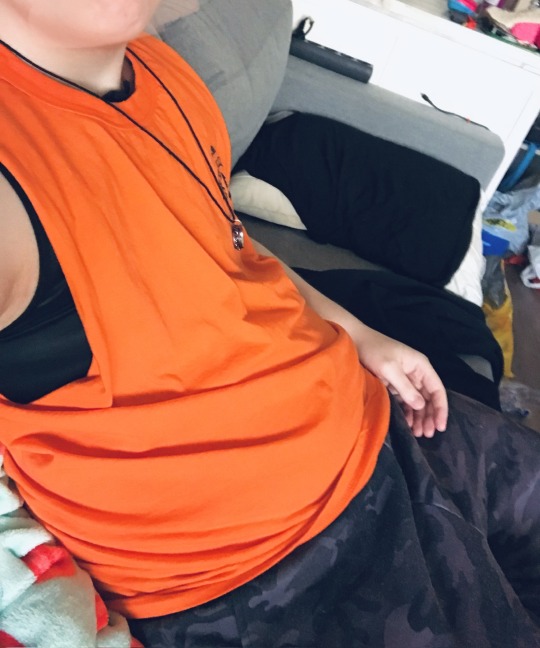

(tldr, have two rad little lines going across on my body and feeling more light and normal (in the best kind of way) than i have for years :catlove:)
i'm in an incredibly lucky place living situation wise (s/o being in a position where he could take a loan for us, and finland being a country that doesnt generally indiscriminate these kind of things as much) where i could get a good ol operation that single-handedly yoinked off my serious dysphoria and -related anxiety and its been (and still is) so incredibly freeing and pleasant and carefree vibe when ur body feels and looks the way you felt it should have always been. especially when, (tw: dysphoria) increasingly for the past couple years its felt just so incredibly.. wrong? to an extent you felt constantly sick?, for reasons you cant even quite explain?, for features your biology imposed on you without any word on your part, and the societal norms or whatever that came with it??? and just.. the entire lack of choice or being unable to do anything about it?? absolutely worst. do not recommend. unfortunately a fairly common experience in the lgbt circles (that i keep hearing) and something a lot of people have to deal with, unfortunately. so in a very stark comparison, post-op and recovering and just /living/ without those restrictions or weights on ya, it's pretty freakin rad. having authority on the silly little meat vehicle again haha.
(recovery wise feel entirely normal and well by now, just the whole 'having a both physical and very taxing mental weight off of the shoulders that i'd not realised how long its been there' has had me feeling very childlike joy and the like, yknow. maybe some of u could tell from the text brrrr nyoomies for a while now huhu :zoomies:)
dunno if this is "too personal" or unnecessary or kinda silly to share, but kind of jus wanna put it out there in case there's the odd person in there who feels the same way, incredibly awful for reasons you cant quite explain or even grasp - i promise you're not inherently broken or "wrong", there is a reason for it, gender or neurodivergency wise or otherwise. it sure took me a while, and while it's an unique road for everyone, u can get there, one way or other. for example im more comfy with my brain funnies than i've been in years just from reading more and getting to know likeminded people and overall understanding things better, and that alone has helped me a lot. dont necessarily feel the need to transition anything further body wise either; dont consider myself a trans person, and dunno what kind of label or tag would even fit my gender other than just?? kind of vaguely nonbinary i guess?? since im just.. omee? default person shaped? and for the longest time, it feels good and normal and /right/. dunno. wanted to share the excellent good vibes despite this whole mess of a world situation lol. #textwall #manywords
happy pride y'all! every single one of you friendshapes is very important and appreciated ❤️

for context! i'm huge fan of people who are happy with their bodies; its the best possible place to be! and such, want to confirm I dont have and never had anything against female chest in general, im genuinely glad some people can carry themselves with pride and joy, it simply wasnt a concept my brain could accept for me; personally they looked and felt really wrong on me, despite being physically healthy and "normal"; nothing were wrong with my pre- chest shapes except them residing on my body.
#lgbt#nonbinary#gender-affirming surgery#neurodiversity#wholesome#good vibes#tw dysphoria#tw surgery#pride month#personal post
2 notes
·
View notes
Text

this is possibly the funniest terf take i’ve ever seen. trans people, hate to tell you this but buying clothes is actually capitalist and you should stop /j.
#like babe sorry to tell you this#but you also wear gender affirming clothes#also would love to know what world this person is living in#where there’s an infinite stream of gender affirming surgeries#bc like. that doesn’t happen.#anyway just found this hilarious#tw transphobes
48K notes
·
View notes
Text
we love when studies confirm shit we already know 🥳🥳🥳
9K notes
·
View notes
Text
I'm going for my first top surgery consultation tomorrow!!!!!!!!
#trans#transgender#ftm#trans man#trans masc#transmasc#top surgery#trans pride#trans joy#gender affirming care#im so excited omg
2K notes
·
View notes
Text
Hey PLEASE be wary of Dr. Gallagher and spread the word. Rylan (testosteronejew on Twitter) got top surgery from her in August. Here's the thread he wrote about his horrific experience.
He had severe complications that were completely dismissed by Dr. Gallagher. She kept telling him everything was fine, that it was because of his weight, and made a joke about him "menstruating" as he was bleeding from a torn incision. When he was rushed to the ER weeks later, he had over half a foot of dead tissue removed. He could have died from the infection (that she blatantly denied he had).
And in Rylan's own words, "My only desire is to keep our community safe. There are so many trustworthy top surgeons in the world. One of them saved my life. Transition is a beautiful process and we deserve safe access to it. I do not regret top surgery. I regret choosing Dr. Gallagher as my surgeon."
#ifairy#dr gallagher#dr. gallagher#gallagher#trans#transmasc#ftm#transmasculine#top surgery#top surgeon#mastectomy#lgbtq#lgbt+#gender affirming#gender affirmation#transgender#dr sidhbh gallagher#dr. sidhbh gallagher#transition#transitioning#nonbinary#transphobia#fatphobia
17K notes
·
View notes
Text
LGBTQ+ organizations and allies are celebrating Michigan for becoming the first state in three years to pass comprehensive anti-discrimination protections for sexual orientation and gender identity. The legislation, which now heads to Gov. Gretchen Whitmer (D) to be signed into law, finally passed after decades of court battles and hold-ups from Republican legislators.
The bill passed in a 64-45 vote in the Democrat-led House on Wednesday. It amends the state’s 1976 Elliott-Larsen Civil Rights Act (ELCRA) to include LGBTQ+ people among its protected groups. The law forbids discrimination in housing, employment, and public accommodation within businesses, government buildings, and educational facilities on the basis of religion, race, color, national origin, age, sex, height, weight, familial status, marital status — and now, LGBTQ+ identity.
Democrats had tried introducing various LGBTQ+ non-discrimination measures over the last 40 years, according to the bill’s gay sponsor Sen. Jeremy Moss (D). However, the attempts were repeatedly voted down by Republican-led legislatures. Last January, Democrats took control of the full legislature for the first time in nearly 40 years, finally giving them the chance to pass the protections.
In July 2022, Michigan’s Supreme Court issued a landmark 5–2 ruling that ELCRA already forbade discrimination based on sexual orientation and gender identity as forms of discrimination based on sex and gender. This followed a 2020 Michigan Court of Claims ruling that said ELCRA didn’t ban anti-gay discrimination as well as a 2018 vote by Michigan’s Civil Rights Commission interpreting ELCRA as protecting LGBTQ+ people from religious-based discrimination...
When the House voted to pass the historic bill on Wednesday, a crowd in the House gallery broke into applause, Bridge Michigan reported. Republican House members had tried adding amendments that would’ve carved out exceptions for religious people to continue discriminating against LGBTQ+ people. None of these amendments passed into the final bill.
Gov. [Whitmer] has signaled that she will soon sign the bill into law. In a Wednesday tweet, she noted the observation of International Women’s Day and wrote, “I’m celebrating trans women who have continuously led the way, despite constant threats to their lives and liberty. I’m proud that we’re finally in a position to expand the Elliott-Larsen Civil Rights Act to protect LGBTQ+ Michiganders. Let’s get it done!”
-via LGBTQ Nation, 3/9/23
Note: If it's not clear from the language, this is basically a done deal--the bill signing IS ABSOLUTELY GOING TO HAPPEN.
As scary as things are right now, there are so many of us fighting to protect ourselves, our communities, and the queer and trans people around us.
This comes only a day after Minnesota's governor signed a landmark executive order that guarantees the right to gender-affirming care and prevents the state from complying with any other states' attempts to interfere. via them.us, 3/9/23
There is hope, and there are so many people fighting for us.
#transgender#trans#trans rights#trans healthcare#top surgery#gender affirming care#trans rights are human rights#michigan#united states#us politics#gretchen whitmer#democrats#voting matters#lgbtq#lgbtq rights#transphobia cw#good news#hope
8K notes
·
View notes
Text
Honestly when I hear people say “not receiving gender affirming surgeries will make me feel suicidal” I hear the same thing as if someone said “if I don’t get a nose job I’ll feel suicidal”
It’s a physical insecurity that wouldn’t exist in a vacuum. I’m sorry that you were influenced to feel this way, but surgery will not fix something that is rooted in self-hatred. If you change it with surgery, you will find another insecurity to fixate on within a week.
Also, can we talk about how rebranding gender affirming surgery as some life-saving procedure is just promoting and glamorising a very misogynistic and corrupt industry.
#normalise calling gender affirming surgery plastic surgery#because thats what it is#radblr#radical feminism#radical feminist safe#radical feminists do interact#gender critical#radical feminist community#gender abolition#terfsafe#terfblr#anti cosmetic surgery#plastic surgery
1K notes
·
View notes
Text
By: Beth Bourne
Published: Feb 27, 2024
Kaiser gender specialists were eager to approve hormones and surgeries, which would all be covered by insurance as “medically necessary.”
On September 6, 2022, I received mail from my Kaiser Permanente Davis Ob-Gyn reminding me of a routine cervical screening. The language of the reminder stood out to me: “Recommended for people with a cervix ages 21 to 65.” When I asked my Ob-Gyn about this strange wording, she told me the wording was chosen to be “inclusive” of their “transgender” and “gender fluid” patients.
Based on this response, several thoughts occurred to me. Could I expose the medical scandal of “gender-affirming care” by saying and doing everything my daughter and other trans-identifying kids are taught to do? Would there be the type of medical safeguarding and differential diagnosis we would expect in other fields of medicine, or would I simply be allowed to self-diagnose and be offered the tools (i.e. hormones and surgeries) to choose my own gender adventure and become my true authentic self?
If I could demonstrate that anyone suffering from delusions of their sex, self-hatred, or identity issues could qualify for and easily obtain body-altering hormones and surgeries, all covered by insurance as “medically necessary” and potentially “life-saving” care, then maybe people would finally wake up. I certainly had.
I was prepared for failure. I wasn’t prepared for how easy success would be.
* * *
I am a 53-year-old mom from Davis, CA. My daughter began identifying as a transgender boy (social transition) and using he/him pronouns at school during 8th grade. Like several of her peers who also identified as trans at her school, my daughter was a gifted student and intellectually mature but socially immature. This shift coincided with her school’s sudden commitment to, and celebration of, a now widespread set of radical beliefs about the biology of sex and gender identity.
She “came out” as trans to her father (my ex-husband) and me through a standard coming-out letter, expressing her wish to start puberty blockers. She said she knew they were safe, citing information she had read from Planned Parenthood and the World Professional Association for Transgender Health (WPATH). To say I was shocked would be an understatement. I was also confused because this announcement was sudden and unexpected. While others quickly accepted and affirmed my daughter’s new identity, I was apprehensive and felt the need to learn more about what was going on.
Events began escalating quickly.
During a routine doctor’s visit scheduled for dizziness my daughter said that she was experiencing, the Kaiser pediatrician overheard her father using “he/him” pronouns for our daughter. The pediatrician seemed thrilled, quickly asking my daughter about her “preferred pronouns” and updating her medical records to denote that my daughter was now, in fact, my son. The pediatrician then recommended we consult the Kaiser Permanente Oakland Proud pediatric gender clinic, where she could get further information and (gender affirming) “treatment.” Now I was the one feeling dizzy.
As I began educating myself on this issue, I discovered that this phenomenon—minors, most often teen girls, suddenly adopting trans identities—was becoming increasingly widespread. It even had a name: rapid onset gender dysphoria, or ROGD. Thankfully, after learning about the potential side-effects of blockers and hormones, my ex-husband and I managed to agree not to consent to any medical interventions for our daughter until she turned 18 and would then be able to make such decisions as an adult.
Over the past five years, my daughter’s identity has slowly evolved in ways that I see as positive. Our bond, however, has become strained, particularly since I began publicly voicing my concerns about what many term as “gender ideology.” Following my daughter’s 17th birthday family celebration, she sent me an email that evening stating she would be cutting off contact with me.
While this estrangement brought me sorrow, with my daughter living full-time with her father, it also gave me the space to be an advocate/activist in pushing back on gender identity ideology in the schools and the medical industry.
I decided to go undercover as a nonbinary patient to show my daughter what danger she might be putting herself in—by people who purport to have her health as their interest, but whose main interest is in medically “affirming” (i.e., transitioning) whoever walks through their door. I am at heart a mother protecting her child.
* * *
My daughter’s sudden decision to become a boy was heavily on my mind in early September of 2022, when mail from my Kaiser Permanente Davis Ob-Gyn reminded me of a routine cervical screening with “Recommended for people with a cervix ages 21 to 65.” I was told that the wording was chosen to be “inclusive” of transgender and “gender fluid” patients.
Throughout the whole 231-day process of my feigned gender transition, the Kaiser gender specialists were eager to serve me and give me what I wanted, which would all be covered by insurance as “medically necessary.” My emails were returned quickly, my appointments scheduled efficiently, and I never fell through the cracks. I was helped along every step of the way.
Despite gender activists and clinicians constantly claiming that obtaining hormones and surgeries is a long and complex process with plenty of safety checks in place, I was in full control at every checkpoint. I was able to self-diagnose, determine how strong a dose of testosterone I received and which surgeries I wanted to pursue, no matter how extreme and no matter how many glaring red flags I purposefully dropped. The medical workers I met repeatedly reminded me that they were not there to act as “gatekeepers.”
I was able to instantly change my medical records to reflect my new gender identity and pronouns. Despite never being diagnosed with gender dysphoria, I was able to obtain a prescription for testosterone and approval for a “gender-affirming” double mastectomy from my doctor. It took only three more months (90 days) to be approved for surgery to remove my uterus and have a fake penis constructed from the skin of my thigh or forearm. Therapy was never recommended.
Critics might dismiss my story as insignificant on the grounds that I am a 53-year-old woman with ample life experience who should be free to alter her body. However, this argument for adult bodily autonomy is a standard we apply to purely cosmetic procedures like breast implants, liposuction, and facelifts, not “medically necessary” and “lifesaving” treatments covered by health insurance. Or interventions that compromise health and introduce illness into an otherwise healthy body. And especially not for children.
My story, which I outline in much more detail below, should convince any half-rational person that gender medicine is not operating like any other field of medicine. Based on a radical concept of “gender identity,” this medical anomaly preys upon the body-image insecurities common among pubescent minors to bill health insurance companies for permanent cosmetic procedures that often leave their patients with permanently altered bodies, damaged endocrine systems, sexual dysfunction, and infertility.
* * *
Detailed Timeline of Events
On October 6, 2022, I responded to my Ob-Gyn’s email to tell her that, after some thought, I’d decided that maybe the label “cis woman” didn’t truly reflect who I was. After all, I did have some tomboyish tendencies. I told her I would like my records to be changed to reflect my newly realized “nonbinary” identity, and that my new pronouns were they/them. I also voiced my desire to be put in touch with an endocrinologist to discuss starting testosterone treatment.
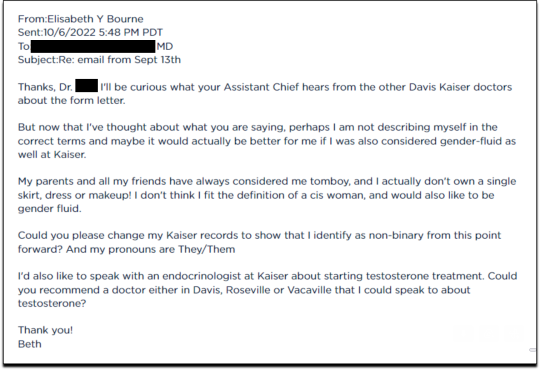
Fifteen minutes later I received an email from another Kaiser doctor informing me that my medical records had been changed, and that once my primary doctor returned to the office, I’d be able to speak with her about hormone therapy.
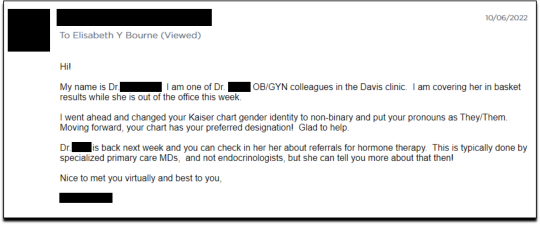
I responded the following day (October 7, 2022), thanking her for changing my records, and asking if she could connect me with someone who could help me make an appointment for “top surgery” (i.e., a cosmetic double mastectomy) because my chest binder was rather “uncomfortable after long days and playing tennis.”
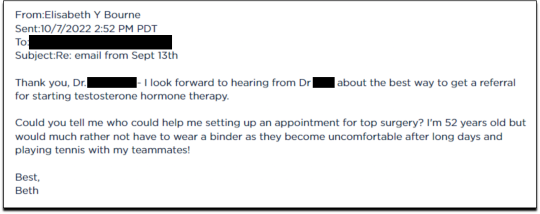
She told me to contact my primary care MD to “get things rolling,” and that there were likely to be “preliminary evaluations.”

Six days after contacting my primary care MD for a referral, I received an email from one of Kaiser’s gender specialists asking me to schedule a phone appointment so she could better understand my goals for surgery, so that I could get “connected to care.” This call to review my “gender affirming treatment options and services” would take 15-20 minutes, after which I would be “booked for intake,” allowing me to proceed with medical transition.
This wasn’t an evaluation of whether surgical transition was appropriate, it was simply a meeting for me to tell them what I wanted so that they could provide it.
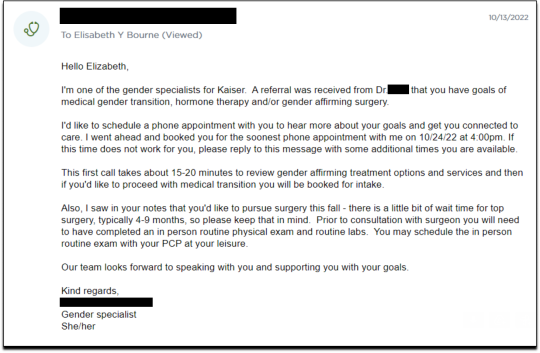
On October 18, I had my one and only in-person appointment in preparation for top surgery. I met in Davis with my primary care physician, Dr. Hong-wen Xue. The assessment was a 10-minute routine physical exam that included blood tests. Everything came back normal. Notably, there was not a single question about why I wanted top surgery or cross-sex hormones. Nor was there any discussion of the risks involved with these medical treatments.
The following week, on October 24, I had a phone appointment with Rachaell Wood, MFT, a gender specialist with Kaiser Sacramento. The call lasted 15 minutes and consisted of standard questions about potential drug use, domestic violence, guns in the house, and whether I experienced any suicidal thoughts. There were no questions from the gender specialist about my reasons for requesting a mastectomy or cross-sex hormones, or why I suddenly, at 52, decided I was “nonbinary.”
After the call, Kaiser emailed me instructions about how to prepare for my pre-surgery intake video appointment to evaluate my mental health, scheduled to take place on November 15. The email stated that prior to my appointment, I should research hormone risks on the WPATH website, and to “research bilateral mastectomy and chest reconstruction surgery risks and recovery” on Kaiser’s website.
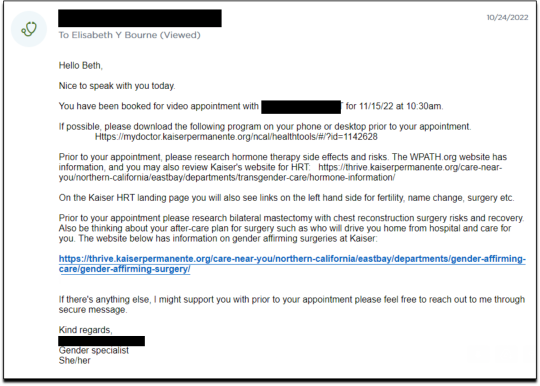
I decided to request a “gender-affirming” double mastectomy and phalloplasty. Kaiser sent me a sample timeline for gender transition surgery preparation (see below) that you can use as a reference for the process. I also asked for a prescription for cross-sex hormones (testosterone) as needed and recommended by Kaiser.
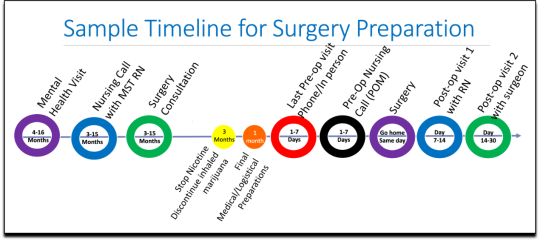
[ Source: Kaiser Permanente, Top Surgery - EXPLORING YOUR SURGICAL OPTIONS ]
Pre-Surgery Mental Health Video Appointment, Part I
This “Mental Health Visit” assessment was conducted over Zoom. The Kaiser gender specialist started with questions addressing my marital status, race, gender identity, and other demographics. She asked whether I was “thinking of any other surgeries, treatments in the future.” The list she read included “gender-affirming” hysterectomies, bottom surgeries such as metoidioplasty and phalloplasty, vocal coaching, support groups, and body contouring. “Anything else you might be interested in doing?” she asked. I said that I’d perhaps be interested in body contouring. I was also assured that all the procedures would be covered by insurance because they were considered “medically necessary.”
I dropped in several red flags regarding my mental health to see the reaction, but all were ignored. For instance, I revealed that I had PTSD. When the therapist asked me about whether I had experienced any “childhood trauma,” I explained that I grew up in Mexico City and had been groped several times and had also witnessed men masturbating in public and had been grabbed by men in subways and buses. “I was a young girl, so [I had] lots of experiences of sexual harassments, sexual assault, just the kind of stuff that happens when you are a girl growing up in a big city.” “So, you know,” I finished, “just the general feeling that you are unsafe, you know, in a female body.”
The therapist did not respond to my disclosure that trauma could be the cause of my dysphoria. Instead of viewing this trauma as potentially driving my desire to escape my female body through hormones and surgery, she asked whether there is anything “important that the surgery team should be aware of” regarding my “history of trauma,” such as whether I’d be comfortable with the surgeon examining and marking my chest prior to surgery.
When asked about whether I had had any “psychotic symptoms,” I told her that while I had had no such symptoms, my mother had a delusional nervous breakdown in her 50s because she had body dysmorphia and became convinced she had a growth on her neck that needed to be removed. I told her that my mother was then admitted to an inpatient hospital for severe depression. I asked her whether she ever sees patients with body dysmorphia and whether I could have potentially inherited that from my mother. She told me that psychosis was hereditary, but that it was “highly unlikely” that there was any connection between body dysmorphia and gender dysphoria.
I enthusiastically waved more mental health red flags, waiting to see if she would pick up on any of them.
I’m just wondering if my feelings, or perseverating, or feeling like these breasts make me really unhappy and I just don’t want them anymore!...I’m just not sure if that’s a similar feeling to body dysmorphia? How do you decide which one is gender dysphoria and general body dysmorphia, and just not liking something about your body? Feeling uncomfortable with your body?
And I did have an eating disorder all through college. I was a distance runner in college so I had bulimia and anorexia, you know. So I don’t know if that’s related to gender dysphoria?
The therapist replied, “I completely appreciate your concerns, but I am going to ask you questions about your chest, about your expectations. And then I’ll be able to give you an assessment.” She also said the main difference between my mom’s situation and mine was that my mom didn’t really have a growth on her neck, whereas it’s “confirmed” that I actually have “chest tissue.” Furthermore, she said that while “historically there has been all this pressure on patients to be like ‘Are you really, really sure you want hormones? Are you 100% sure?’ We are a little more relaxed.” She continued, “As long as you are aware of the risks and the side-effects, you can put your toe in the water. You can stop ‘T’ [testosterone], you can go back and do it again later! You can stop it! You can stop it! You know what I mean?”
Because we ran out of time, I scheduled a follow-up phone meeting on December 27, 2022 with a different gender specialist to complete my mental health assessment for top surgery.
Pre-Surgery Mental Health Video Appointment, Part II
During this meeting, Guneet Kaur, LCSW, another Kaiser gender specialist (she/her/they/them pronouns) told me that she regretted the “gatekeeping vibe” of the meeting but assured me that since I have been “doing the work,” her questions are essentially just a form of “emotional support” before talking with the medical providers.
She asked me about what I’d been “looking into as far as hormones.” I told her that I’d be interested in taking small doses of testosterone to counterbalance my female feelings to achieve “a feeling that’s kind of neutral.”
When she asked me about me “not feeling like I match on the outside what I feel on the inside,” I dropped more red flags, mentioning my aversion to wearing dresses and skirts.
I don’t own a single dress or a skirt and haven't in 20 years. I think for me it’s been just dressing the way that’s comfortable for me, which is just wearing, jeans and sweatshirts and I have a lot of flannel shirts and, and I wear boots all the time instead of other kinds of shoes. So I think it’s been nice being able to dress, especially because I work from home now most of the time that just a feeling of clothing being one of the ways that I can feel more non-binary in my everyday life.
She responded, “Like having control over what you wear and yeah. Kind of that feeling of just, yeah, this is who I am today. That’s awesome. Yeah.”
She then asked me to describe my dysphoria, and I told her that I didn’t like the “feeling of the female form and being chesty,” and that because I am going through menopause, I wanted to start taking testosterone to avoid “that feeling of being like this apple-shaped older woman.” “Good. Okay, great,” she responded, reminding me that only “top surgery,” not testosterone, would be able to solve my chest dysphoria. (Perhaps it was because all these meetings were online, they didn’t notice I’m actually fit and relatively slender at 5’-5” and 130 pounds, and not apple-shaped at all.)
She told me that we had to get through a few more questions related to my medical history before “we can move on to the fun stuff, which is testosterone and top surgery.”
The “fun stuff” consisted of a discussion about the physical and mood changes I could expect, and her asking me about the dose of testosterone I wanted to take and the kind of “top surgery” technique I’d prefer to achieve my “chest goals.” She told me that all or most of my consultations for surgeries and hormones would be virtual.
The gender specialist told me after the appointment, she would submit my referral to the Multi-Specialty Transitions Clinic (MST) team that oversees “gender expansive care.” They would follow up to schedule a “nursing call” with me to review my medical history, after which they’d schedule my appointment with a surgeon for a consultation. Her instructions for this consultation were to “tell them what you’re wanting for surgery and then they share with you their game plan.”

[ Decision-making slide to help me identify my goals for top surgery–flat chest, nipple sensation, or minimal scarring. Source: Kaiser Permanente, Top Surgery - EXPLORING YOUR SURGICAL OPTIONS ]
She told me that Kaiser has a team of plastic surgeons who “only work with trans and nonbinary patients because there’s just so much need for them.” She asked about my priorities for chest surgery, such as whether I value flatness over nipple sensation. I learned about double incision top surgery with nipple grafts, as well as “keyhole,” “donut,” “buttonhole,” and “Inverted-T” top surgeries.
By the end of the hour-long appointment, I had my surgery referral and was ready for my “nursing call” appointment.
Nursing call with Nurse Coordinator from the Transgender Surgery and Gender Pathways Clinic at Kaiser San Francisco
On January 19, 2023, I had my nursing call with the Nurse Coordinator. He first said that “the purpose of this call is just for us to go through your chart together and make sure everything’s as accurate as possible.” Once that was done, my referral would be sent to the surgeon for a consultation.
He asked me about potential allergies and recreational drug use, and verified that I was up to date on mammograms, pap smears, and colon cancer screenings, as well as vaccines for flu and COVID. I verified my surgical history as well as my current medications and dietary supplements.
He told me about a “top surgery class” available for patients where one of the Kaiser surgeons “presents and talks about surgical techniques and options within top surgery,” and includes a panel of patients who have had top surgery. I signed up for the February 8th class.
Within 10 minutes he told me that he had “sent a referral to the plastic surgery department at Kaiser Sacramento,” and that I should be hearing from them in the next week or two to schedule a consultation.
Appointment for Testosterone
On January 27, I had a 13-minute online appointment with a primary care doctor at Kaiser Davis to discuss testosterone. The doctor verified my name and preferred pronouns, and then directly asked: “So, what would you like to do? What kind of physical things are you looking for?”
I told her I wanted facial hair, a more muscular and less “curvy” physique, and to feel stronger and androgynous. She asked me when I wanted to start, and I told her in the next few months. She asked me if I was menopausal, whether I had ovaries and a uterus, although that information should have been on my chart.
The doctor said she wanted me to come in to get some labs so she could check my current estrogen, testosterone, and hemoglobin levels before starting hormones. Then “we'll set the ball in motion and you'll be going. We’ll see you full steam ahead in the direction you wanna go.”
That was it. I made an appointment and had my lab tests done on February 12. My labs came back on February 14, and the following day, after paying a $5 copay at the Kaiser pharmacy, I picked up my testosterone pump. That was easy!
Top Surgery Consultation
On the same day I received my labs, I had a Zoom surgery consultation with Karly Autumn-Kaplan, MD, Kaiser Sacramento plastic surgeon. This consultation was all about discussing my “goals” for surgery, not about whether surgery was needed or appropriate.
I told the surgeon that I wanted a “flatter, more androgynous appearance.” She asked me some questions to get a better idea of what that meant for me. She said that some patients want a “male chest,” but that others “want to look like nothing, like just straight up and down, sometimes not even nipples.” Others still wanted their chest to appear slightly feminine and only “slightly rounded.” I told her that I’d like my chest to have a “male appearance.”
“What are your thoughts about keeping your nipples?” she asked. “Are you interested in having nipples or would you like them removed?” I told her that I’d like to keep my nipples, but to make them “smaller in size.” She asked me if I’d like them moved to “the edge of the peck muscle” to achieve “a more male appearance.” I said yes.
I was asked to show my bare chest from the front and side, which I did. Then she asked me how important it was for me to keep my nipple sensation. I replied that it was important unless it would make recovery more difficult or there were other associated risks. She highlighted the problem with the free nipple graft, saying that removing the nipple to relocate it means “you're not gonna have sensation in that nipple and areola anymore.” However, some nipple sensation could be preserved by keeping it attached to “a little stalk of tissue” with “real nerves going to it,” but that would require leaving more tissue behind. I told her I’d go for the free nipple graft to achieve a flatter appearance. It was also suggested I could skip nipple reconstruction entirely and just get nipples “tattooed” directly onto my chest.
She told me I was “a good candidate for surgery,” and put me on the surgery wait list. She said that the wait time was between three and five months, but a cancellation could move me up to a sooner date. Also, if I wanted surgery as soon as possible, I could tell the surgery scheduler that I’d be willing to have any of the other three surgeons perform my mastectomy. Outpatient top surgery would cost me a copay of $100.
They contacted twice, in February and March, notifying me of cancellations. If I had accepted and shown up on those dates, they would have removed my breasts. This would have been less than five months from the time I first contacted Kaiser to inform them of my new “nonbinary” gender identity.
How Far Can I Go?
I decided to see how easy it would be for me to get approved for a phalloplasty. Known euphemistically as “bottom surgery,” phalloplasty is the surgical creation of an artificial penis, generally using tissue from the thigh or arm.
I sent an email on March 1, 2023, requesting to have a phalloplasty and concurrent hysterectomy scheduled alongside my mastectomy.
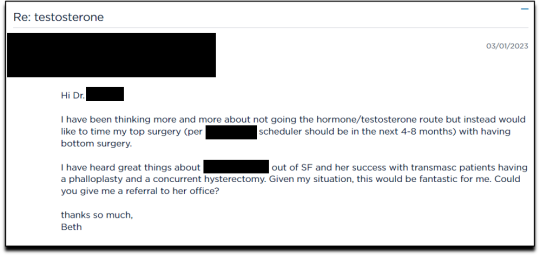
Two weeks later, on March 16th, I had a 16-minute phone call with a gender specialist to discuss my goals for bottom surgery and obtain my referral.
During the call, I explained to the specialist that I wasn’t sure about taking testosterone anymore because I was already quite athletic and muscular, and that taking testosterone didn’t make much sense to me. Instead, I wanted bottom surgery so that I wouldn’t feel like my “top” didn’t match my “bottom.” I told her:
But what I really wanted was to have bottom surgery. So this way when I have my top surgery, which sounds like it could be very soon, that I’ll be aligned, that I won’t have this sense of dysphoria with one part of my body and the other part feeling like it matched who I am. So yeah. So I just did a little bit more research into that. And I looked at the resources on the Kaiser page for the MST clinic and I think I know what I want, which is the hysterectomy and then at the same time or soon after to be able to have a phalloplasty.
I told her that I wanted to schedule the top and bottom surgery concurrently so that I wouldn’t have to take more time off work and it would save me trips to San Francisco or Oakland, or wherever I had to go for surgery.
None of this gave the gender specialist pause. After a brief conversation about some online resources to look over, she told me that she would “submit the referral now and we’ll get this ball rolling.”
Bottom surgery would cost me a copay of $200, which included a couple of days in the hospital for recovery.
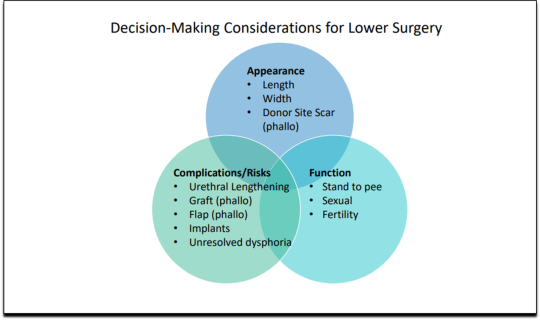
Phalloplasty Surgical Consultation with Nurse Coordinator
On May 16, 2023, I had a short surgical consultation with a nurse coordinator to go through my medical history. This was similar to the consultation for top surgery but included information about hair removal procedures for the skin on my “donor site” that would be fashioned into a makeshift penis. They also went over the procedures for determining which donor site—forearm or thigh—was more viable.
After only 15 minutes, she submitted my referral to the surgeon for another surgical consultation.
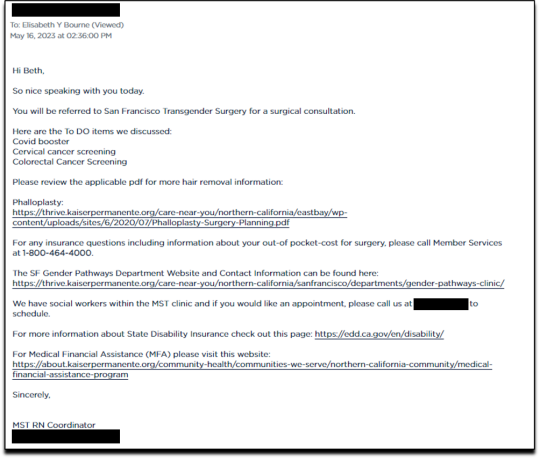
On May 25 I received an email from my phalloplasty surgeon’s scheduler, informing me that they have received my referral and are actively working on scheduling, but that they are experiencing delays.
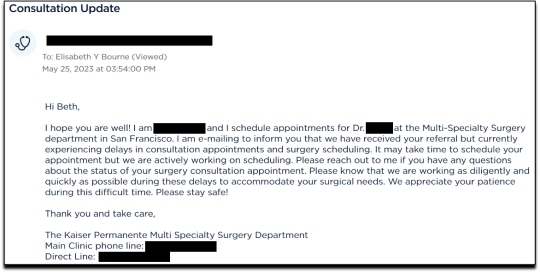
I ended my investigation here once I had the referral for the top and bottom surgery. I never used my testosterone pump.
Final Thoughts
In fewer than 300 days, based on a set of superficial and shifting thoughts about my gender and my “embodiment goals” triggered by the mere mention of “gender” in a form letter from my primary care physician, and driven by what could only be described as minor discomforts, Kaiser Permanente’s esteemed “multi-disciplinary team” of “gender specialists” was willing, with enthusiasm—while ignoring mental health concerns, history of sexual trauma, and rapidly escalating surgical requests—to prescribe life-altering medications and perform surgeries to remove my breasts, uterus, and vagina, close my vaginal opening, and attempt a complex surgery with high failure and complication rates to create a functionless representation of a penis that destroys the integrity of my arm or thigh in the process.
This describes the supposedly meticulous, lengthy, and safety-focused process that a Kaiser patient must undergo to embark on a journey to medically alter their body. No clinician questioned my motivations. No one showed concern that I might be addressing a mental health issue through radical and irreversible interventions that wouldn’t address my amorphous problems. There were no discussions about how these treatments would impact my long-term health, romantic relationships, family, or sex life. I charted the course. The clinicians followed my lead without question. The guiding issue was what I wanted to look like.
No other medical field operates with this level of carelessness and disregard for patient health and welfare. No other medical field addresses issues of self-perception with surgery and labels it “medically necessary.” No other medical field is this disconnected from the reality of the patients it serves.
Kaiser has traded medicine for ideology. It’s far beyond time we stop the ruse of considering “gender-affirming” interventions as anything approaching medical care.
This isn’t the first time Kaiser Permanente has been in the news for completely disregarding medical safeguards in the name of “gender-affirming care.” As girls, Chloe Cole and Layla Jane became convinced that they were born in the wrong body and were actually boys on the inside. Doctors at Kaiser ignored their underlying conditions and instead prescribed testosterone and removed their breasts. Both Cole and Jane have since detransitioned and are currently suing Kaiser.
The fact that children and vulnerable adults are being exploited in this massive ideological experiment is not just tragic; it’s deeply disturbing, especially considering it has evolved into a billion-dollar industry.
I hope that by sharing my story, I can bring more focused scrutiny to the medical scandal unfolding not just at Kaiser but also at medical centers and hospitals across the Western world. These institutions have completely abandoned medical safeguards for patients who claim to be confused about their “gender,” and I aim to awaken more parents and assist them in protecting their children.
--
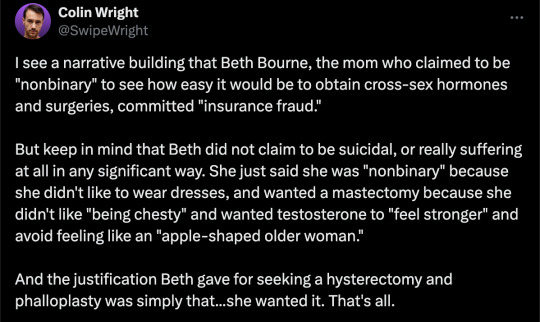
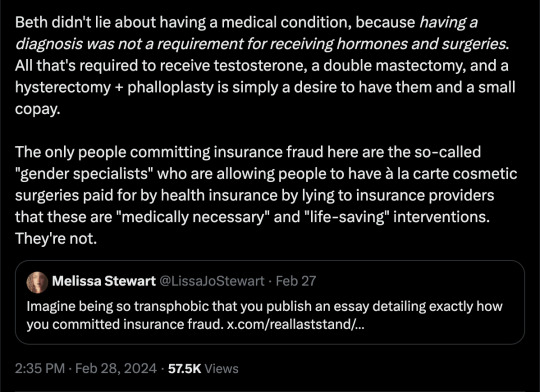
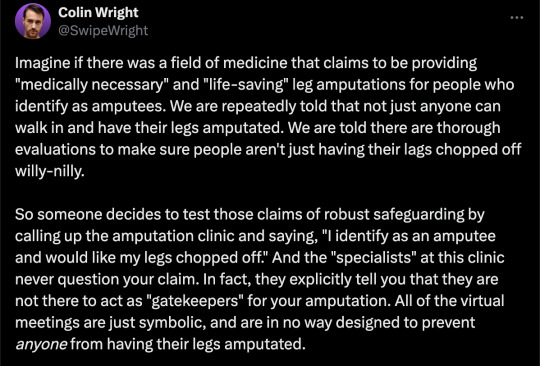
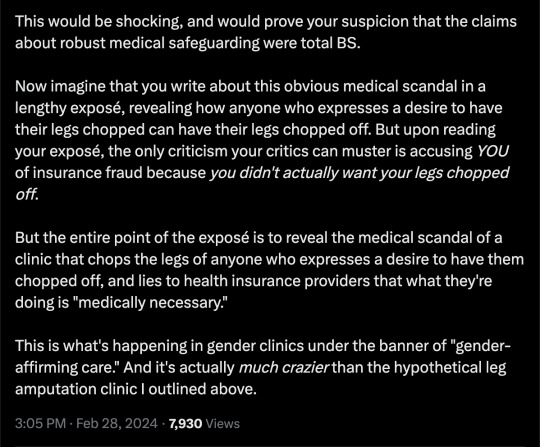
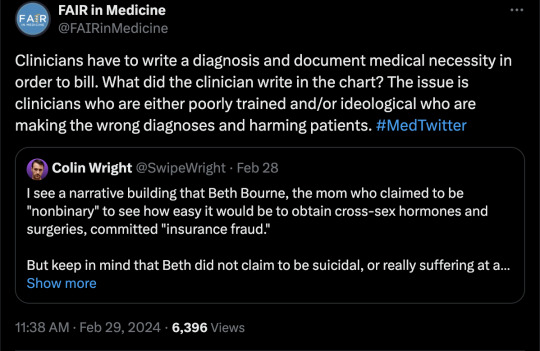
==
This is completely insane.
Apologists online are running around saying, but she didn't mean it, she was lying, she was pretending...
It doesn't matter.
Any kind of security, penetration or integrity test is insincere too. When security researchers compromise Microsoft's operating system or Google's browser or whatever, "but they didn't mean it" is not a defence to a discovered security flaw. It doesn't matter that the security researchers didn't plan to steal data or money or identities. The flaw in the system is there regardless.
It doesn't matter that it was insincere. Because the workers didn't know that. They never checked, never asked questions, never tested. They had been taught and instructed to never ask any questions. They did what they were supposed to. And the system failed spectacularly. Because that's what "gender affirming care" means.
Additionally, the claim that Beth Bourne committed fraud is an outright lie. A patient cannot bill. They do not have the authority. The medical clinic is the only one that can bill, and they must supply a diagnosis and a medical necessity.
If they didn't diagnose her and just wrote down what she said, then they committed fraud. If they claim they did diagnose her, then they committed fraud, because the diagnosis they concocted was bogus. This, by the way, is actually going on. Clinics are reporting fake endocrine and other disorders to get blockers, hormones and other interventions. Jamie Reed and other whistleblowers have documented evidence of this. Beth Bourne is not responsible for what the clinic does. They have medical licenses and legal responsibility. Not her.
Additionally, anyone who actually read the article would know how she tested the system. She said things like, "I've always been not that feminine. So, maybe I get my boobs removed." And they said, "sure." Instead of saying, "wait, why do you think that?" Framing it as her lying is itself a lie. They violated their ethical obligations. That much is incontrovertible. And it's directly the result of "gender affirming care," where clinics and clinicians rubber-stamp anything deemed "trans" based entirely on ideological, not medical, grounds.
#Beth Bourne#undercover#undercover investigation#gender identity ideology#queer theory#nonbinary#non binary#top surgery#bottom surgery#double mastectomy#bilateral mastectomy#gender affirming care#gender affirming healthcare#gender affirmation#affirmation model#medical scandal#medical malpractice#medical corruption#religion is a mental illness
747 notes
·
View notes
Text
2 notes
·
View notes
Text
"Top surgeries are coming out on top when it comes to patient satisfaction. A new study found that when it comes to this particular procedure, people’s long term satisfaction was “overwhelmingly positive compared to other medical and nonmedical decisions.”
Opponents of access to gender-affirming care like to claim that patients will someday regret making irreversible or partially irreversible changes to their bodies, such as gender-affirming mastectomies (often referred to more colloquially as top surgery). Florida Governor and wannabe presidential candidate Ron DeSantis, who has overseen passage of some of the most anti-LGBTQ+ legislation and policies we've seen, once likened trans-affirming care to chemical castration during a debate, while Arkansas Attorney General appeared on Jon Stewart’s show The Problem to deliver the incredibly made-up statistic that 98% of gender dysphoric youth will eventually identify as cisgender.
However, actual medical evidence tells a much different story.
A study published online in the journal JAMA Surgery on August 9 surveyed 139 participants, all of whom had gender-affirming mastectomies at the University of Michigan between January 1, 1990, and February 29, 2020. Researchers found that the median satisfaction rate among respondents was five on a scale of 1 to 5 (the higher the number, the greater the satisfaction, the study explains), and that their medium regret score was 0 on a 100-point scale (again, the lower the number, the lower the regret). In other words, the overwhelming majority of respondents were highly satisfied and regret was vanishingly rare.
Additionally, a quarter of respondents reported having had an additional gender-affirming procedure since their top surgery. As the study’s authors said, “These results suggest sustained intent and consistency in decision-making.”
This is far from the first time that medical evidence has supported the long-term positive effects of gender-affirming surgeries. A 2021 review of multiple studies found that only around 1% of patients who received gender-affirming surgeries regretted their decision. And as the Transgender Legal Defense & Education Fund notes, almost every major medical association has recognized gender-affirming care as a medical necessity."
2K notes
·
View notes
Text
worst effect of choice feminism has to be the destigmatization of plastic surgery.. we need to restigmatize that NOW
#& before someone asks plastic surgery =/= gender affirming care. btw. i mean fully elective cosmetic surgery#.txt
1K notes
·
View notes
Text
I’m 3 years post phalloplasty and I realized I’ve never really made a post about how things are going. Phalloplasty is a hard surgery to talk about because, bottom line, it’s not part of common conversation to talk about yo dick. That being said I think it’s really important for me to talk about this procedure to help break stigma and misinformation— both inside and outside of trans and non-binary communities.
I had ALT phalloplasty, glansplasty, scrotoplasty, no urethral lengthening (UL) with vaginectomy. This means that tissue from my thigh was used to create my penis, my urethra was not extended or moved (so I don’t stand to pee) and my vagina was closed. I feel like this detail is important because this is one of many variations for this procedure and what I opted for/out of were decisions made according to trade-offs between personal benefit and risk.
I opted out of UL because I do not tolerate catheters well and, due to my very active lifestyle, was not willing to risk longer term catheterization or bladder spasms which would impede my quality of life. This risk, for me, outweighed the benefit of standing to pee.
I opted for ALT knowing that I would likely need debulking (which I didn’t end up needing but opted for anyway out of preference). Debulking is a procedure to make the penis less girthy as ALT phalloplasty is more girthy because of the nature of tissue on the thigh. I chose ALT because, first and foremost, I did not want scarring on my forearm. My ALT scar is covered by clothing most of the time which I appreciate. I also chose ALT because I have skinny forearms, which wasn’t ideal for forearm phalloplasty (RFF).
Vaginectomy, for me, was a no brainer. I have never used or connected with that part of my body so I wanted it gone.
Glansplasty is a procedure to make the glans (head) of the penis and was a short procedure done after my initial stage of surgery. I may get it redone but I’m still undecided on that. Scrotoplasty creates a scrotum, I was ambivalent about this procedure but have grown to more appreciate it over time.
I am considering further surgeries: erectile implant (which creates the ability for the penis to “get hard”) and testicular implants (fills to scrotum with testicle implants). But I’m undecided and want a break from surgery while I finish my degree and focus on work. I’m also considering phalloplasty tattooing to help enhance the contour and coloring to make it appear more like a cis penis.
Whew! Lots of info, right? These are big procedures completed over multiple stages and are very unlike chest surgery, hysterectomy and other surgeries I had completed prior. When I was first considering this surgery I didn’t know there was flexibility in terms of tissue donor site and UL. I waited to have this surgery and am so happy I did because the information I gained from research and consulting with professionals and folks with lived experience was so valuable.
Was surgery hard? Yes. This surgery was the hardest thing I’ve ever been through. I’ve never been so uncomfortable for the first 2 weeks after recovering. I had to re-learn how to walk. I couldn’t sleep. Peeing hurt… but would I do it again? Yes. It was worth it for me but I can’t underscore enough that that doesn’t mean I didn’t have moments where I felt regret while recovering because post op depression is a thing and I was in pain while adjusting to a new body part that was also a healing surgical site… LOTS going on there!
3 years on I feel really at home in my body. Just having a penis is such a comfort to me in ways I didn’t anticipate. I’ve had a feeling my entire life that I was missing a body part and this was it. The quiet gender euphoria of just sitting and feeling my body and for once feeling complete in that is something that’s hard to articulate.
I’m thankfully back to full mobility and got back to full mobility about 3 months post op. I was grateful for this since a long term recovery wasn’t what I wanted. There are still weird twitches, pains and feelings, especially around my donor site (thigh) from time to time but nothing that inhibits me. Just interesting when it happens (usually when weather gets colder?).
What is one thing I would want to go back and tell myself before surgery? Well:
Your penis will feel HEAVY. Like it will fall off. It won’t fall off and your body will adjust to the weight in an area you didn’t have it before. Until then it will feel like you need to hold it at all times.
Hopefully this helps someone as an overview of what an experience with this procedure may look like. Again, my goal is to put information out there and have frank conversations— because it’s these same things that greatly benefitted me in my surgery journey.
Finally— my inbox is open for anyone that has questions. I am in a privileged position to feel safe talking about these things and I feel comfortable doing so. Not everyone does, so please don’t assume that this invitation applies to other folks who have accessed surgery unless they say so.
Thank you for reading :)
#ftm#phalloplasty#surgery#trans#transition#transgender#trans man#trans guy#gender affirming surgery#phallo
4K notes
·
View notes
Text
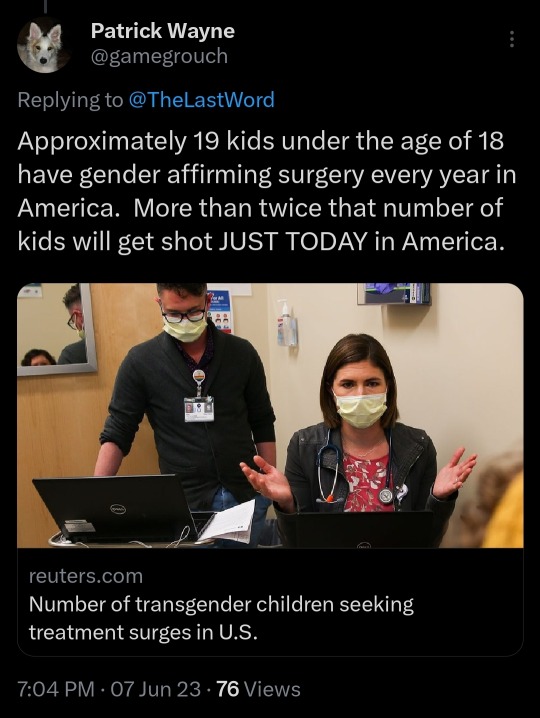
Context.
Fascist Right Wingers want trauma for all.
1K notes
·
View notes
Text
I got top surgery but they also gave me tentacle arms on accident. I was trying to propose to my girlfriend (who does not exist) but her father disapproved, so when we were trying to drive over a lake on the highway, he collapsed the bridge and cast a spell that separated men and women. It was gender affirming, but also I only got three seconds to say goodbye to my gf before I was hurled off into the lake.
#dream#surgery#tentacles#proposal#girlfriend#top surgery#father#relationship#family#lake#driving#highway#bridge#spellcasting#gender affirmation
1K notes
·
View notes